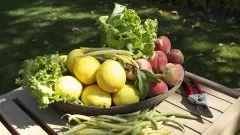
Turn Your Thumb Green: Expert Concepts Behind Successful Plant Growing 
Turn Your Thumb Green: Expert Concepts Behind Successful Plant Growing is the perfect course for anyone looking to learn the concepts behind successful plant growing. From understanding the biology and plant physiology concepts to selecting the right components to create the ideal growing environment, this course will help you turn your thumb green! With practical examples, step-by-step instructions, and pro tips and tricks, you'll be a plant expert in no time. ▼
ADVERTISEMENT
Course Feature
![]() Cost:
Cost:
Free Trial
![]() Provider:
Provider:
Skillshare
![]() Certificate:
Certificate:
No Information
![]() Language:
Language:
English
![]() Start Date:
Start Date:
On-Demand
Course Overview
❗The content presented here is sourced directly from Skillshare platform. For comprehensive course details, including enrollment information, simply click on the 'Go to class' link on our website.
Updated in [April 29th, 2023]
This course, Turn Your Thumb Green: Expert Concepts Behind Successful Plant Growing, is designed to help students understand the biology and plant physiology concepts behind healthy plants. Through this course, students will learn how to evaluate and select different components to create the ideal growing environment for new plants or seedlings. The lessons in this course are broken down into five units: Place, Pot, Soil, Plant, and Potting It All Together. Students will also learn Pro Tips and Tricks, and will need access to a digital camera or scanner to submit their assignments.
[Applications]
Upon completion of this course, students will be able to apply the concepts they have learned to create the ideal growing environment for their plants. They will be able to evaluate and select the components necessary for successful plant growth, such as the right place, pot, soil, and plant. They will also be able to repot plants and start new seeds and rooted cuttings. Additionally, they will be able to use the pro tips and tricks they have learned to ensure their plants thrive.
[Career Paths]
Career Paths:
1. Plant Nursery Manager: Plant nursery managers are responsible for overseeing the day-to-day operations of a plant nursery. They are responsible for managing staff, ordering supplies, and ensuring that plants are properly cared for. Plant nursery managers must have a deep understanding of plant biology and physiology, as well as the ability to manage a team. This position is expected to grow in the coming years as more people become interested in gardening and plant care.
2. Plant Breeder: Plant breeders are responsible for developing new varieties of plants. They use their knowledge of plant biology and physiology to create new varieties of plants that are more resistant to disease, more productive, or more aesthetically pleasing. Plant breeders must have a deep understanding of plant genetics and the ability to conduct research and experiments. This position is expected to grow in the coming years as more people become interested in developing new varieties of plants.
3. Landscape Designer: Landscape designers are responsible for creating aesthetically pleasing outdoor spaces. They must have a deep understanding of plant biology and physiology, as well as the ability to design and create beautiful outdoor spaces. This position is expected to grow in the coming years as more people become interested in creating outdoor spaces that are both functional and aesthetically pleasing.
4. Horticultural Consultant: Horticultural consultants are responsible for providing advice and guidance to clients on how to care for their plants. They must have a deep understanding of plant biology and physiology, as well as the ability to provide advice and guidance to clients. This position is expected to grow in the coming years as more people become interested in learning how to properly care for their plants.
[Education Paths]
Recommended Degree Paths:
1. Horticulture: Horticulture is the science and art of growing fruits, vegetables, flowers, and ornamental plants. It involves the study of plant growth, soil management, pest control, and landscape design. This degree path is ideal for those interested in learning the fundamentals of plant growing and developing their green thumb. It is also a great way to gain knowledge and skills in the field of plant biology, soil science, and landscape design.
2. Plant Science: Plant Science is the study of plants and their interactions with the environment. It involves the study of plant physiology, genetics, ecology, and biochemistry. This degree path is ideal for those interested in learning the scientific principles behind plant growth and development. It is also a great way to gain knowledge and skills in the field of plant biology, genetics, and ecology.
3. Agronomy: Agronomy is the science and practice of producing and using plants for food, fuel, fiber, and land reclamation. It involves the study of soil management, crop production, and pest control. This degree path is ideal for those interested in learning the fundamentals of crop production and soil management. It is also a great way to gain knowledge and skills in the field of plant biology, soil science, and pest control.
4. Plant Pathology: Plant Pathology is the study of plant diseases and their causes, effects, and control. It involves the study of plant diseases, their causes, and methods of control. This degree path is ideal for those interested in learning the fundamentals of plant diseases and their control. It is also a great way to gain knowledge and skills in the field of plant biology, plant pathology, and disease control.
Developing Trends:
1. Sustainable Agriculture: Sustainable agriculture is an increasingly popular trend in the field of plant growing. It involves the use of sustainable practices such as crop rotation, integrated pest management, and conservation tillage to produce crops in an environmentally friendly manner.
2. Urban Agriculture: Urban agriculture is the practice of growing food in urban areas. It involves the use of urban spaces such as rooftops, balconies, and vacant lots to grow food. This trend is becoming increasingly popular as more people are looking for ways to grow their own food in urban areas.
3. Hydroponics: Hydroponics is the practice of growing plants in water without the use of soil. It involves the use of nutrient-rich solutions to provide plants with the necessary nutrients for growth. This trend is becoming increasingly popular as more people are looking for ways to grow plants in a more efficient and sustainable manner.
Pros & Cons

Suitable for beginners

Stepbystep instructions

Learned a lot

None mentioned
Course Provider

Provider Skillshare's Stats at AZClass
Discussion and Reviews
0.0 (Based on 0 reviews)
Explore Similar Online Courses

Developing Android Apps

How To Rank First Page Google With ChatGPT SEO Extension (New Strategy 2023)

Python for Informatics: Exploring Information

Social Network Analysis

Introduction to Systematic Review and Meta-Analysis

The Analytics Edge

DCO042 - Python For Informatics

Causal Diagrams: Draw Your Assumptions Before Your Conclusions

Whole genome sequencing of bacterial genomes - tools and applications

Aquaponic Gardening: Growing Fish and Vegetables Together

Vegetable Gardening: How to Grow Healthy Fresh Food at Home


Start your review of Turn Your Thumb Green: Expert Concepts Behind Successful Plant Growing